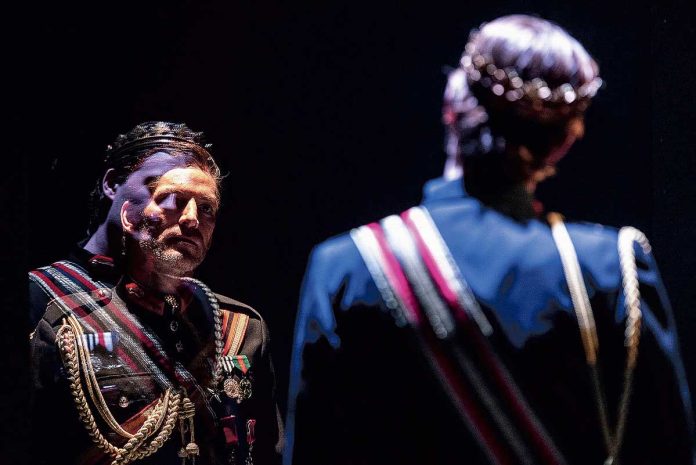The Player Kings: Part 1
Adaptor: Damien Ryan
Director: Damien Ryan
Seymour Centre
March 27 – April 5, 2025
Sport for Jove’s The Player Kings: Part 1, a reframing of Shakespeare’s historical cycle, Richard II, Henry IV (parts 1 & 2) and Henry V into a durational dramatic event, is compelling, astonishing and revelatory. The four hours, with two short breaks, fly by as we watch three human beings struggle with the illusory nature of power as they play out the role of king.
While Shakespeare didn’t write the plays in chronological sequence nor are they historically accurate in detail, Damien Ryan’s weaving together of these cautionary political tales underlines a Shakespearean preoccupation. By dramatising a moment, the tipping point, we can feel the future arrive.
When Richard II, a facile sad character superbly captured by Sean O’Shea, seizes the Lancastrian estates after the death of John of Gaunt (an excellent John Gaden who delivers Gaunt’s well-known death-bed speech with authenticity), it is palpable that his role as King has come to end. Deaf to his perceptive, uneasy wife (a sympathetic Katrina Retallick), obsessed with his own image – loving the photo opportunity – Richard is goaded into retaliating to Gaunt’s strictures on his reign. Significantly, Gaunt in turn had been encouraged to publicly upbraid the King by the Duchess of York (a sinister Leilani Loau) who is fearful of Lancastrian dominance. So much personal input, the tangled web of desire for power, to be the “influencer”.
A king may, to Richard’s incredulity as he believes his role is sacred, be deposed (and so may a president) but he is also just a man who has no idea how to govern rationally. His nemesis, the strategic Bolingbroke, his cool restraint well portrayed by Garth Davies, imprisons Richard, perhaps knowing he will be murdered.
Times have changed, the tipping point, and now as Henry IV, he can’t appease his human conscience, and while Richard had no heir, Henry does, the wild Prince Hal (a devil-may-care Oliver Ryan), who is “beyond his command”. Hal’s consorting with the drunken, zesty Falstaff (a roistering but with depth, Steve Rodgers) and the Eastcheap crew brings the king disrepute, and he faces an uprising engineered by those who wanted the overthrow of Richard and who are playing the long game.
The uprising is led by young Harry Hotspur (played with lovely vigour by Max Ryan), a model of courage and honour. As is inevitable, Shakespeare will bring Harry Hotspur and a now reformed Prince Hal together in mortal combat and the next tipping point. No guesses who wins although not without humiliation for Hal. Like the image of the sacred role of king, the image of chivalrous courage and honour becomes a past value replaced by strategic ruler-craft as the dying Henry IV advises his son to declare war on a foreign power to unify his kingdom.
The new model is now Prince Harry, shortly to be Henry V, and in a brilliant piece of stagecraft, the young Prince Hal faces his new image, the stern-faced leader of men, played with frightening decisiveness by Andrew Cutcliffe. A new model king with a “common touch”, gained perhaps from his time spent with Falstaff and his cheerful but doomed mates.
Falstaff is an interesting character and Rodgers brings to this very famous role a less hedonistic attitude. He does betray Hal, and it is unlikely that he would be truly surprised when Henry V, his former drinking companion, cuts him off – unless, of course, like Richard II, he believed in his role. His speech as he rejects the concept of honour is simply self-pity, as is Richard’s lament for himself.
The poet Yeats observed that “that all men great and little fail in Shakespeare” and Damian Ryan seems to share this vision, but with the important proviso that it is because they are men, human beings, who arrive on the world stage without scripts, unlike the theatre.
A special mention of two scenes which are beyond hilarious. First, the gardeners’ dialogue, an extremely funny Peter Carroll ably supported by Gaden, which signals how thoroughly Richard II has bungled his role, and secondly, the tavern scene in which the elderly Francis (Carroll), a server of beer, runs between demanding “patrons”.
There are so many people involved in this magnificent production. The superb set, both metaphoric and literal, the wonderful and indispensable live musical accompaniment and dramatic punctuation (Jack Mitsch), characterisation in the costuming (Lily Moody) and the clever use of projection. Many thanks to Damien Ryan for a genuinely exciting, fast-moving and totally absorbing adaptation of Shakespeare.
I hope there will be a chance to review The Player Kings: Part 2.





